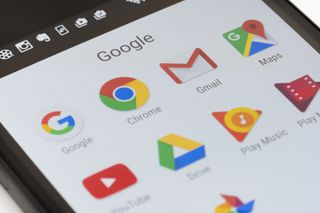Google Plans To Stop Scanning Emails To Personalize Gmail Ads

Call it trickle-down privacy: Google announced that it will no longer scan your emails to personalize the ads you see in Gmail. The company said this change results from its decision to make the professional version of Gmail, which is included in G Suite, "more closely align" with the consumer version. G Suite customers already have this level of privacy; now the billion-plus people who don't pay a cent for Gmail will also be able to enjoy it.
That isn't to say personalized ads will entirely disappear from Gmail. You're still going to see targeted ads--it's just that Google plans to use existing data (search history, YouTube activity, etc.) instead of scanning all your emails. Odds are good that you probably won't even notice the change. The company's built on ads, so if it thought improved privacy would hurt its ability to sell ads, it would likely maintain the status quo.
But the continued presence of targeted ads doesn't diminish the importance of this change. Google previously offered you two options: pay for its services or let it scan your emails. Privacy was basically just another premium feature offered to those who could afford G Suite, which starts at $5 per month for each user, and not the average consumer. Now privacy comes standard instead of being something for which you pay extra.
"This decision brings Gmail ads in line with how we personalize ads for other Google products. Ads shown are based on users’ settings," Google said in its announcement. "Users can change those settings at any time, including disabling ads personalization. G Suite will continue to be ad free."
This change might result from increasing anxiety over privacy. Many services, from Signal to ProtonMail, have found success in recent years because they can't snoop on your communications. Not that they could if they wanted to--they and other services have turned to end-to-end encryption to prevent intelligence agencies, hackers, and others from intercepting your communications and using them for their own purposes.
Deciding to make Gmail a little more private could help Google convince people to stick with its service instead of turning to others. And even if the company's ability to personalize ads does take a slight hit, it's better to risk showing irrelevant ads t than to lose the ability to show any ads at all. In its announcement, Google accidentally supported the idea that it wants to keep its users happy with this "elevator pitch" for Gmail:
The value of Gmail is tremendous, both for G Suite users and for users of our free consumer Gmail service. Gmail is the world’s preeminent email provider with more than 1.2 billion users. No other email service protects its users from spam, hacking, and phishing as successfully as Gmail. By indicating possible email responses, Gmail features like Smart Reply make emailing easier, faster and more efficient. Gmail add-ons will enable features like payments and invoicing directly within Gmail, further revolutionizing what can be accomplished in email.
Stay on the Cutting Edge
Join the experts who read Tom's Hardware for the inside track on enthusiast PC tech news — and have for over 25 years. We'll send breaking news and in-depth reviews of CPUs, GPUs, AI, maker hardware and more straight to your inbox.
Google said it plans to stop email scanning in Gmail "later this year." More details about when the change will be made or how it will roll out weren't provided.

Nathaniel Mott is a freelance news and features writer for Tom's Hardware US, covering breaking news, security, and the silliest aspects of the tech industry.
-
LeeRains Okay. I guess I'm a bit of a dunce, but I didn't know about the "g-suite" option, and even if I had heard about it, I didn't know it prevented Google from archiving all your email for whatever nefarious things they're up to. Five dollars a month for email privacy with gmail? That's an easy $5 to spend. SMHReply
Most Popular






